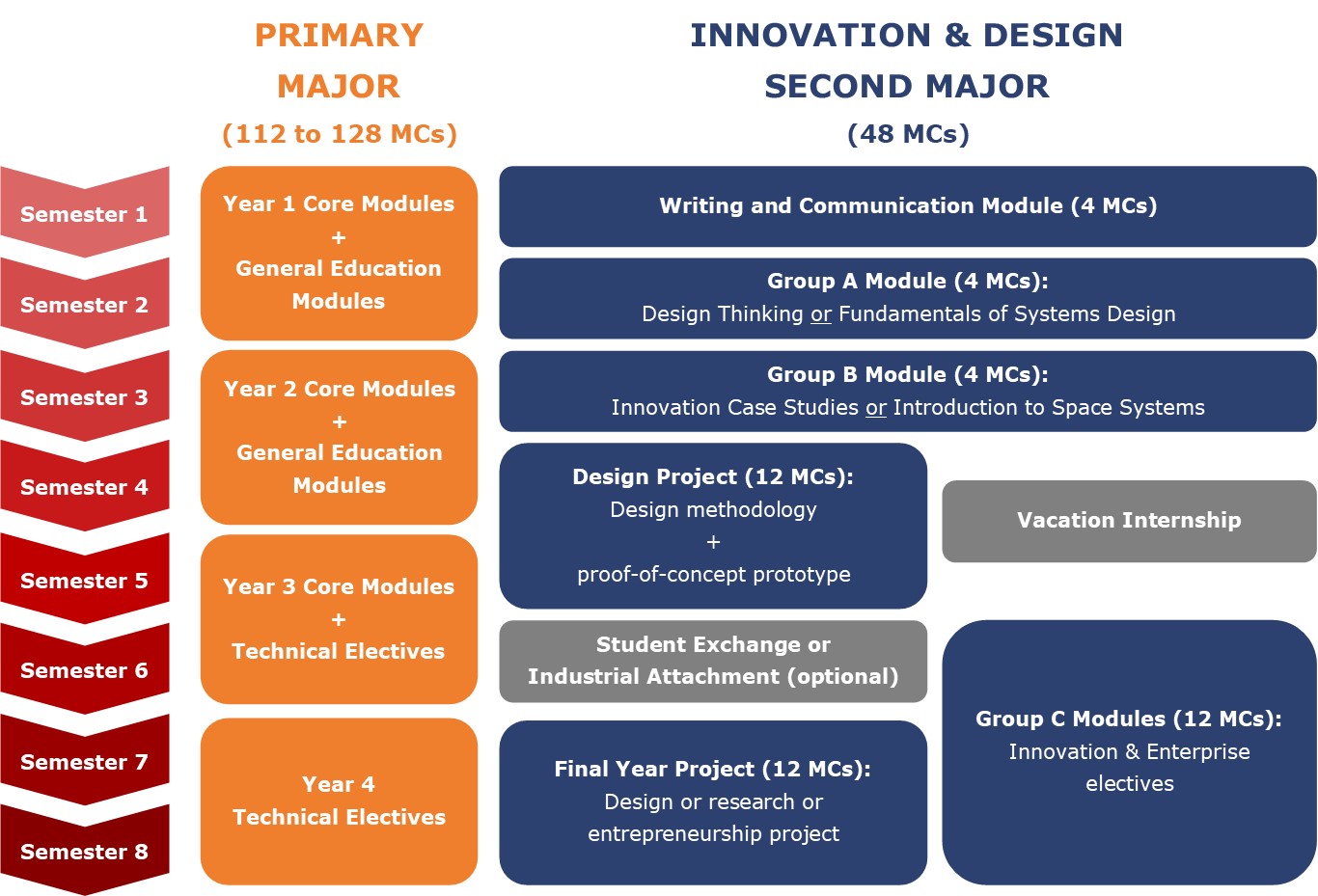Second Major in Innovation & Design: Cohorts AY2016/2017 to AY2018/2019
The Innovation & Design Programme – which is offered as the Second Major in Innovation & Design for Cohort 2017/2018 onwards – consists of a series of project-based modules that run throughout a student’s candidature. Students are expected to develop their knowledge, skills, and abilities in innovation and design in a cumulative manner through these modules. The learning journey begins with lower-level modules that introduce students to basic concepts in innovation and design, and culminates in a major design project and a final year project where students are expected to apply their design knowledge and skills to develop solutions to real problems. Students will also take a number of Innovation & Enterprise electives to widen their knowledge about topics in design, business, and entrepreneurship.

The requirements of the Second Major in Innovation & Design are as follows:
| Modules | Remarks |
|---|---|
| Writing and Communication:
ES1531/ES2531 Critical Thinking & Writing (4 MCs) or equivalent |
Double-counted between Second Major and primary major.
Non-Engineering students will take the writing and communication modules from their home faculties. Ideas & Exposition modules are counted as equivalents for students in residential colleges. The module should be read following the recommended schedule for each student's primary major. |
Group A – complete ONE of the following:
|
Counted as UEM.
Default is EG2201A. EG1310/EG2310 is meant for students who intend to work on projects in complex engineering systems. EG1310 has been replaced by EG2310 from AY2019/2020 onwards. May be exempted for poly-intake students with relevant qualifications. |
Group B – complete ONE of the following:
|
Counted as UEM.
Default is EG2301 (previously Case Studies in Engineering). EG2311 is meant for students who intend to work on satellite-related projects. EG2312 is meant for those who are interested in radar systems. EG2606B is reserved for students in special competition projects only. |
| Group C – complete 12 MCs from the basket of Innovation & Enterprise electives. | Generally counted as UEM.
Some modules may be double-counted between Second Major and primary major for students from Business and Life Sciences. 4 MCs may be exempted for poly-intake students with relevant qualifications. |
| EG3301R DCP Project (12 MCs) | For students from Engineering, either one will replace design project or final year project module in the primary major (i.e. double-counted between Second Major and primary major) while the other is counted as UEM.
For non-Engineering students, EG3301R is counted as UEM. EG4301/EG4301A could replace the final year project module in the primary major (i.e. double-counted between Second Major and primary major) or vice-versa. |
| EG4301 DCP Dissertation (12 MCs) or EG4301A Ideas to Start-up (12 MCs) |
To fulfil their compulsory internship requirement, Engineering students in this Second Major may complete EG3612 Vacation Internship Programme (6 MCs) in lieu of EG3611A Industrial Attachment (10 MCs) or EG3611 Industrial Attachment (12 MCs). The vacation internship should be completed during the summer break between Semesters 4 and 5. However, poly-intake students and those in the Engineering Scholars Programme (previously known as the Global Engineering Programme) are exempted from the internship requirement. They may take other modules to satisfy the 6 MCs.
Students who missed the Group A and Group B modules Semester 2 and Semester 3 respectively may clear these modules in a later semester.
Students who participate in the NUS Overseas Colleges (NOC) programmes may map some of their NOC modules to the Second Major. The details may be found under Internships & Student Exchange.
Students may also enrol in a specialisation or a minor on top of their primary major and the Second Major in Innovation & Design. However, those who do so may need to graduate with additional modules above and beyond the minimum 160 MCs needed for graduation.
Click on the links below for more details about the requirements, recommended semester schedules, and timelines for various Engineering and non-Engineering primary majors with the Second Major in Innovation & Design across different cohorts.
Cohort AY2018/2019
Engineering programmes:
- Biomedical Engineering
- Chemical Engineering
- Civil Engineering
- Computer Engineering
- Electrical Engineering
- Engineering Science Programme
- Environmental Engineering
- Industrial & Systems Engineering
- Materials Science & Engineering
- Mechanical Engineering
Non-Engineering programmes:
Cohort AY2017/2018
- Biomedical Engineering
- Chemical Engineering
- Civil Engineering
- Computer Engineering
- Electrical Engineering
- Engineering Science Programme
- Environmental Engineering
- Industrial & Systems Engineering
- Materials Science & Engineering
- Mechanical Engineering
Cohorts AY2016/2017

